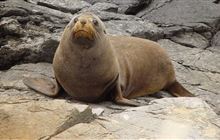Napier welcomes Antarctic guest
Archived content: This media release was accurate on the date of publication.
Introduction
Napier was treated to a rare sight today – the seventh Weddell seal to visit New Zealand shores ever recorded.Date: 03 August 2018
The juvenile mammal was seen resting on one of the city’s beaches and was confirmed to be a Weddell seal by Department of Conservation marine technical staff.
Ranger Rod Hansen says while this is only the seventh reported sighting of this species in New Zealand, it is the second reported sighting in Napier.
“The first visit we received, was back in 2007 – so it is truly a rare sighting indeed,” he says.
The Weddell seal – named by James Weddell, who was a British sailor and seal hunter – is the most southern living mammal to permanently inhabit the Antarctic continent.
They grow up to three metres long and can weigh in at 500 kg. Throughout their lives the seals remain close to their breeding colonies – usually travelling no further than 100 km from their breeding colonies.
However, there have been reports of migrations up to several hundred km – especially by younger seals.
This is why rare sightings of the Weddell seals have been reported not only in New Zealand but in Australia.
DOC Hawke's Bay Operations Manager (Acting) Moana Smith-Dunlop says DOC’s preferred policy is not to intervene with these seals.
"Although it can be tempting to help, human interaction is detrimental to their development," she says.
DOC takes a 'hands off' approach to seals, because seals are capable, resilient creatures and if given time and space they usually find their way home.
There are exceptions to this hands-off rule. DOC rangers will intervene, if the animal is in notably poor condition, immediate danger, tangled in debris, causing disruption or being harassed by people or dogs.
Moana Smith-Dunlop says people should stay at least 20 m away from the Weddell seal and should not disturb it by making loud noises or throwing things.
It is also important for dog owners to keep their pets under control at all times when around seals. Please keep an eye out, especially in off-leash areas, as marine animals share these spaces.
It is an offence under the Marine Mammals Protection Act 1978 to disturb, harass, harm, injure or kill a seal. A dog owner whose dog attacks a seal could face prosecution.
If people are concerned about a seal they see, ask: is the seal in danger, injured or being harassed by people or dogs. If so, call our emergency hotline 0800 DOC HOT (0800 362 468).
Contact
For media queries contact:
Email: media@doc.govt.nz

